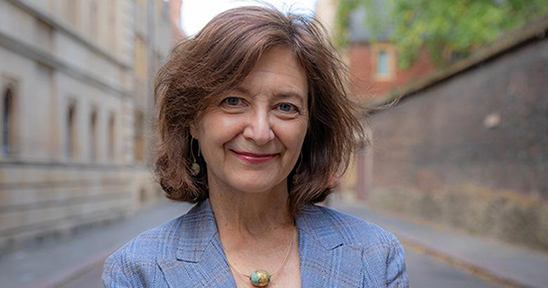
Current post-holder
Professor Deborah Prentice became the 347th Vice-Chancellor of the University on 1 July 2023 following the end of Dr Anthony Freeling's tenure as Acting Vice-Chancellor. Professor Prentice was previously Provost at Princeton and is an eminent psychologist with academic expertise in the study of social norms that govern human behaviour.
History
The Vice-Chancellor is the principal academic and administrative
officer of the University, and is its resident head. From the late fifteenth
century up until 1992, the Vice-Chancellor was elected annually from amongst
the Heads of Cambridge Colleges, and usually served for two years in succession,
without relinquishing the Headship. The
Vice-Chancellorship is now a full-time position, and is appointed by the
Council from an international pool, for a period of up to seven years (five
years in the first instance); the post can no longer be held simultaneously
with a College Headship or any other University post.
Powers and duties
The Vice-Chancellor's role is to
provide academic and administrative leadership to the whole of the University. The Vice-Chancellor works closely with the five Pro-Vice-Chancellors, as well as with the
Registrary, and leads
this senior team in ensuring the University's overall mission is being met and
that policies established by the various governing and legislative bodies are
being fulfilled. The Vice-Chancellor
plays a leading part in shaping the academic development of the University,
particularly through the recruitment of senior staff; the VC also exercises
leadership to secure a sustainable financial base sufficient to allow the
delivery of the University’s mission, aims, and objectives.
A key part of the Vice-Chancellor's
role is to represent the University both locally and externally to governments
in the UK and overseas, to major donors and supporters, thus helping to raise
the profile of the University nationally and internationally. The
Vice-Chancellor leads development activities, including fundraising and the
reinforcement of the University's reputation and scope, both in the UK and
overseas. The Vice-Chancellor also
works alongside the Heads of the Colleges to ensure there is a close
relationship between the University and the Colleges and that the Colleges' and
the University's aims are represented coherently. There are numerous formal and
informal interactions between the Vice-Chancellor and the Heads of the
Colleges, including the Colleges Committee, chaired by one of the Heads.
In common with the Chancellor, the Vice-Chancellor has the statutory
power 'to see that all officers of the University duly perform their
duties'. The Vice-Chancellor chairs the Council of the University and the General Board
of the Faculties, and may choose to chair the Finance Committee of the
Council. The Vice-Chancellor also carries
out numerous ceremonial and civic duties.
The Vice-Chancellor has the power to appoint Deputy Vice-Chancellors from among the Heads of Colleges or other members of the Regent House to whom statutory and other duties may be assigned. The names of Deputy Vice-Chancellors are published annually in the Reporter. The Vice-Chancellor may additionally nominate any member of the Regent House to undertake duties.